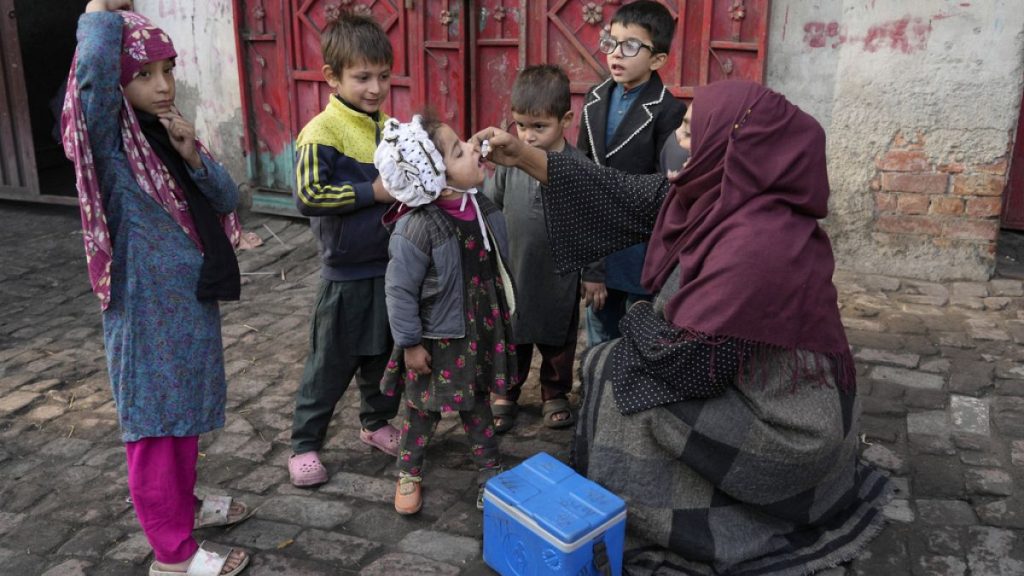Pakistan is undertaking its final nationwide polio vaccination campaign of the year in a determined effort to eradicate this crippling disease. This urgent push comes as Pakistan, along with neighboring Afghanistan, remains one of the last two countries where polio is still endemic. The campaign, targeting 45 million children under the age of five, began in October and is scheduled to continue until December 22nd. The resurgence of polio cases this year, with 63 confirmed instances since January, underscores the challenges faced by health officials and the critical need for this vaccination drive. The program faces persistent opposition from militant groups who propagate misinformation, claiming the vaccines are a Western plot to sterilize children. This dangerous narrative fuels violence against healthcare workers, necessitating extensive security measures.
The commitment to eradicating polio is evident in the government’s mobilization of thousands of police officers to protect vaccination teams. This protection is vital given the tragic history of attacks on polio workers. Two recent incidents highlight the ongoing dangers: a police officer was killed and a health worker wounded in an attack in Karak, Khyber Pakhtunkhwa province, while another officer was injured in a separate incident in Bannu. These attacks, while disheartening, have not deterred the government’s resolve, as underscored by Prime Minister Shehbaz Sharif’s recent meeting with medical staff and his vow to win the war against polio. The dedication of healthcare workers and security personnel, who risk their lives to protect children from this preventable disease, is a testament to the importance of this campaign.
Despite the logistical hurdles and security threats, Pakistan’s government remains deeply committed to eliminating polio. Ayesha Raza Farooq, the prime minister’s adviser for the polio eradication programme, has made a personal appeal to parents, urging them to cooperate with health workers and ensure their children receive the life-saving vaccine. This plea reflects the understanding that community participation is essential for the success of the campaign. The widespread deployment of security forces underscores the government’s recognition of the dangers faced by vaccination teams and their commitment to ensuring the campaign’s completion. The prime minister’s direct engagement and vocal support further emphasize the national priority placed on polio eradication.
The challenges in Pakistan are mirrored in Afghanistan, where at least 23 confirmed polio cases have been reported in 2024. The situation in Afghanistan was further complicated in September when the Taliban abruptly halted door-to-door vaccination campaigns, dealing a significant blow to regional eradication efforts. This setback highlights the fragility of progress and the importance of consistent, uninterrupted vaccination coverage. The interconnectedness of the two countries’ polio situations necessitates a coordinated regional approach to effectively combat the virus. The suspension of the vaccination campaign in Afghanistan raises concerns about cross-border transmission and the potential for reinfection in Pakistan, further complicating eradication efforts.
The highly infectious nature of the poliovirus emphasizes the urgency and global significance of these eradication efforts. Any unvaccinated population, particularly children, represents a potential reservoir for the virus, threatening to undermine years of progress and potentially leading to resurgences in other parts of the world. The continued presence of polio in these two countries poses a risk to global health security. The international community must support both Pakistan and Afghanistan in overcoming the challenges they face in their fight against polio. Sustained financial and technical assistance is crucial for strengthening healthcare systems, improving vaccination coverage, and counteracting misinformation campaigns that hinder progress.
The final push to eradicate polio in Pakistan is a critical moment in the global fight against this devastating disease. The challenges are significant, including security concerns, misinformation, and the logistical complexities of reaching every child. However, the unwavering commitment of the government, healthcare workers, and security personnel, coupled with the support of international partners, offers hope for a polio-free future for Pakistan and the world. The success of this campaign holds immense importance, not only for the health and well-being of Pakistani children but also for the global effort to finally eradicate this crippling disease and protect future generations.














